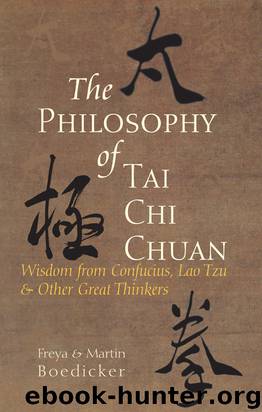The Philosophy of Tai Chi Chuan by Freya Boedicker

Author:Freya Boedicker [Boedicker, Freya and Martin ]
Language: eng
Format: epub
ISBN: 978-1-58394-439-4
Publisher: North Atlantic Books
Published: 2011-07-26T04:00:00+00:00
(FROM CHAPTER 30)
Wuzi
6
Wuzi
THE STRATEGIST WUZI (CA. 440–381 BC) is generally recognized as the first great general of China. He fought often against overwhelming odds, but was never defeated. The book Wuzi was probably written by him, but it was published by his students as a summary of his strategic philosophy. In his book, Wuzi deals with how one can form a stable and durable state. He is of the opinion that civilian and military aspects of the government are of equivalent importance. Only if both are sufficiently considered can a state prosper. Furthermore, he explains how the military is to be led. He considers practical aspects, from war preparations to specific tactics in battle.
If one says of Sunzi that his thinking has Daoist roots, then, in contrast, Wuzi is the Confucian among the strategists. He says this also of himself. In the Records of the Historian (Shiji), it is written about the two that whenever military affairs were discussed, both names, Sunzi and Wuzi, were mentioned together.
Those who learn Tai Chi Chuan practice an old Chinese martial art. Nevertheless, most students of Tai Chi Chuan view the use of violence skeptically. This skepticism can also be found in the texts of the strategists of old China. Although they were responsible for warfare, they warn time and again that violence may be only the last of all means. Wuzi presents a good example of this.
Wuzi says,
The way (dao) is the means
by which one turns back to the roots
and returns to the original one.
Righteousness is the means
by which one acts correctly and earns achievements.
Planning is the means
by which one keeps harm distant and gains profit.
Having a foundation is the means
by which one protects the achieved and preserves existence.
If the actions are not in accord with the way (dao)
and the behavior is not in accord with righteousness,
then one may be high-ranking and noble,
but misfortune will strike one nevertheless.
Therefore, the sage pacifies the people with the way (dao),
regulates them with righteousness,
moves them with the ritual,
and pacifies them by humanity (ren).
If these four inner powers (de) are cultivated, one flourishes.
If they are ignored, decline follows.
Download
This site does not store any files on its server. We only index and link to content provided by other sites. Please contact the content providers to delete copyright contents if any and email us, we'll remove relevant links or contents immediately.
| Anthropology | Archaeology |
| Philosophy | Politics & Government |
| Social Sciences | Sociology |
| Women's Studies |
The remains of the day by Kazuo Ishiguro(8969)
Tools of Titans by Timothy Ferriss(8363)
Giovanni's Room by James Baldwin(7320)
The Black Swan by Nassim Nicholas Taleb(7105)
Inner Engineering: A Yogi's Guide to Joy by Sadhguru(6785)
The Way of Zen by Alan W. Watts(6600)
Asking the Right Questions: A Guide to Critical Thinking by M. Neil Browne & Stuart M. Keeley(5757)
The Power of Now: A Guide to Spiritual Enlightenment by Eckhart Tolle(5746)
The Six Wives Of Henry VIII (WOMEN IN HISTORY) by Fraser Antonia(5496)
Astrophysics for People in a Hurry by Neil DeGrasse Tyson(5181)
Housekeeping by Marilynne Robinson(4436)
12 Rules for Life by Jordan B. Peterson(4299)
Double Down (Diary of a Wimpy Kid Book 11) by Jeff Kinney(4259)
The Ethical Slut by Janet W. Hardy(4241)
Ikigai by Héctor García & Francesc Miralles(4239)
Skin in the Game by Nassim Nicholas Taleb(4235)
The Art of Happiness by The Dalai Lama(4125)
Skin in the Game: Hidden Asymmetries in Daily Life by Nassim Nicholas Taleb(3987)
Walking by Henry David Thoreau(3952)
